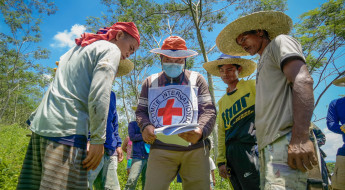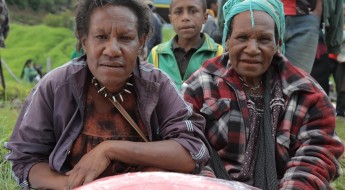“The school grounds turned into a battlefield during the fight”: Voices from PNG’s schoolyards
 “I was in Grade 4 when the fight broke out. There was a lot of disruption to classes. Shortly after that, I stayed for a year and six months without going to school. I really want to go to school, I want to be someone in the future, and I want the fighting to stop. I would like everyone to live in peace the way things were. I want our mothers and other girls like me to live freely.” Eli, 14, Hela ProvinceICRC / Erika Patricia Tovar Gonzalez
“I was in Grade 4 when the fight broke out. There was a lot of disruption to classes. Shortly after that, I stayed for a year and six months without going to school. I really want to go to school, I want to be someone in the future, and I want the fighting to stop. I would like everyone to live in peace the way things were. I want our mothers and other girls like me to live freely.” Eli, 14, Hela ProvinceICRC / Erika Patricia Tovar Gonzalez “I missed school for two years because of the fight. We had to hide in the jungle. We lost our home and a loved one. I want to continue my studies and become a pilot in the future. I encourage students after me to concentrate on education if they want change.” Joyce Alfred, grade 8, Wabi Primary School, Southern Highlands ProvinceICRC / Reuben Tabel
“I missed school for two years because of the fight. We had to hide in the jungle. We lost our home and a loved one. I want to continue my studies and become a pilot in the future. I encourage students after me to concentrate on education if they want change.” Joyce Alfred, grade 8, Wabi Primary School, Southern Highlands ProvinceICRC / Reuben Tabel “School opens doors to a better life. I want to complete my studies and get a job so I can support my family.” Flexson Mapu, grade 8, Wabi Primary School, Southern Highlands ProvinceICRC / Reuben Tabel
“School opens doors to a better life. I want to complete my studies and get a job so I can support my family.” Flexson Mapu, grade 8, Wabi Primary School, Southern Highlands ProvinceICRC / Reuben Tabel “I want my children to go to school. I do not want them to be taken to the haus man Palamanda [for initiation of boys into manhood] to be trained as fighters. I want them to get an education.” Jane, Hela ProvinceICRC / Samuel Bariasi
“I want my children to go to school. I do not want them to be taken to the haus man Palamanda [for initiation of boys into manhood] to be trained as fighters. I want them to get an education.” Jane, Hela ProvinceICRC / Samuel Bariasi “People have realised how violence has affected children’s education, which is why they decided to cease fighting … people have contributed to restoring access to education." Robert Tawe, Teacher at Wabi Primary School, Southern Highlands Province. Wabi School in Papua New Guinea's Highlands was shaken by a tribal fight that broke out in late 2019. The school had to close for years but has now become a place of peace following long negotiations and peace talks between the fighting communities, aided by neighbouring neutral communities who pushed for peace.ICRC / Emily Contador-Kelsall
“People have realised how violence has affected children’s education, which is why they decided to cease fighting … people have contributed to restoring access to education." Robert Tawe, Teacher at Wabi Primary School, Southern Highlands Province. Wabi School in Papua New Guinea's Highlands was shaken by a tribal fight that broke out in late 2019. The school had to close for years but has now become a place of peace following long negotiations and peace talks between the fighting communities, aided by neighbouring neutral communities who pushed for peace.ICRC / Emily Contador-Kelsall “The kids are very happy. They are happy, they have interest in coming back to school after being absent for three years, three and a half years. Like myself, all the other teachers, we are really happy to be working again, teaching again… we are happy to be back in the classrooms.” Kepson Pokia, Head Teacher of Wabi Primary School, which is rebuilding following fighting.ICRC / Emily Contador-Kelsall
“The kids are very happy. They are happy, they have interest in coming back to school after being absent for three years, three and a half years. Like myself, all the other teachers, we are really happy to be working again, teaching again… we are happy to be back in the classrooms.” Kepson Pokia, Head Teacher of Wabi Primary School, which is rebuilding following fighting.ICRC / Emily Contador-Kelsall
In Papua New Guinea's Highlands tribal fighting isn't always constrained to a battlefield - it can spill over and damage public infrastructure like schools, threatening entire communities' access to education.
Amongst the violence school grounds can be looted and damaged. Sometimes, students and their families have no choice but to flee their homes and hide to survive - going years before returning to classes.
The portraits above provide a small snapshot of how students, parents and teachers' lives are impacted by fighting in Hela Province and Southern Highlands Province.
Education not only equips children and young people with tools for the future, but also provides a sense of normalcy and is an important centre of community life. Education helps people rebuild their lives with dignity and agency after violence. Ensuring the continuity of education and a safe learning environment despite violence is a humanitarian priority.
The International Committee of the Red Cross works in Papua New Guinea's Highlands with communities affected by tribal fighting, including support to schools and students. We help communities rebuild schools after violence by providing resources such as blackboards, stationary, desks, sanitary facilities and construction materials like new water tanks, concrete, plywood and roofing sheets.


